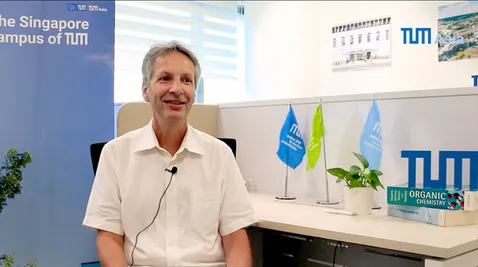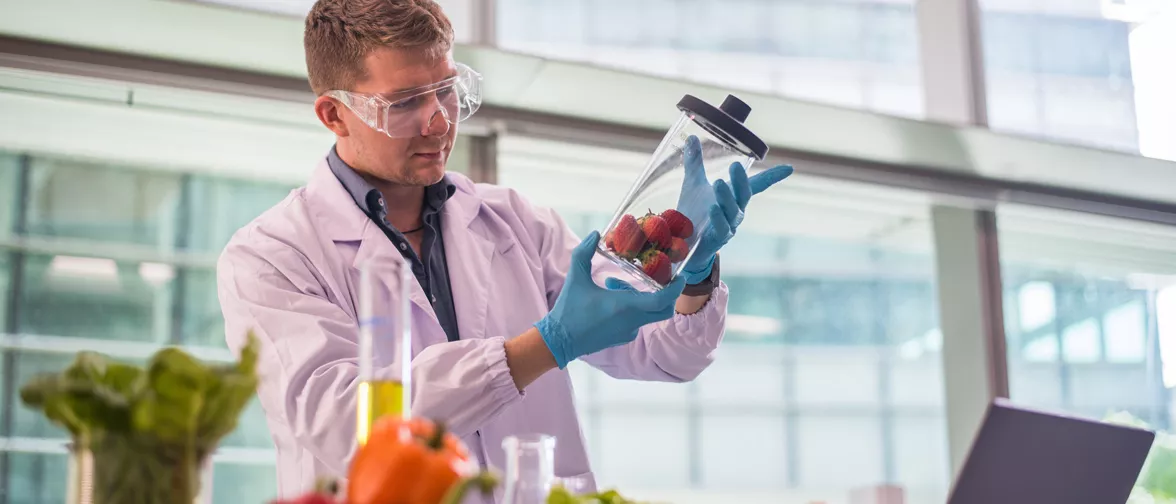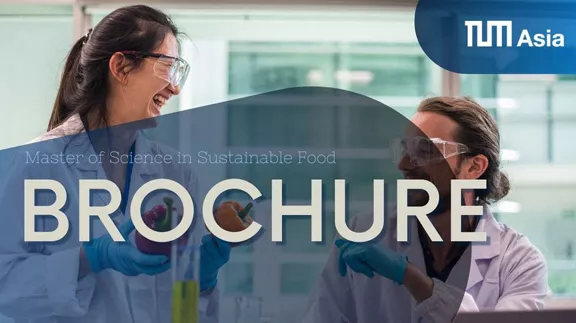Sustainable Food
Master of Science (M.Sc.)
Do you think globally and want to tackle the nutrition and food safety challenges of tomorrow? Then the international English-language Master's degree program in Sustainable Food is right for you. Here you will gain knowledge of the most important pillars of the global food system, with a particular focus on food technology and safety. In addition, you will gain a comprehensive understanding of new and emerging technologies in the agri-food industry and the development of trends and issues in an ever-changing world.
Become part of the first Master's program of the TUM School of Life Sciences, designed with TUM Asia, in Singapore!
Key data
| Type of Study | Full Time |
| Standard Duration of Studies | 4 Semesters |
| Credits | 120 ECTS |
| Start of Degree Program | Middle of August |
| Application Period and Admission Category | Further information on the application procedure and the required documents at TUM Asia. |
| Language of Instruction | English |
| Main Location | Singapur |
| Costs | Student Fees, Tuition fees |
A safe and sustainable food supply is a major problem for the growing world population. The World Health Organization (WHO) and the Food and Agriculture Organization (FAO) are therefore promoting circular and sustainable food systems, which will require additional food monitoring programs in the future. In addition to these political goals, we are observing a change in consumers' eating habits in modern societies. Demand is increasingly focused on more diverse, ethically correct and environmentally friendly foods. Awareness and demand for higher food quality and standards is increasing. It is therefore crucial for food companies to focus on sustainability, food safety and quality assurance in order to stand out from the competition.
Your path to leadership in the agri-food industry
The Master’s program aims to develop future leaders in the agri-food industry to create a new generation of sustainable and safe food. To this end, you will develop strategies to integrate the highly fragmented and complicated food system. Your studies will enable you to think critically and engage in solution-oriented discussions. This will enable you to establish new ethical standards to bring about effective structural change in our current food system. At the same time, you will pave the way for a new generation of sustainable food that meets global nutritional needs.
Our increasingly interconnected and globalized world has led to a greater diversity of food crossing the globe and finding its way to different corners of the world. This has consequently brought global food safety and food systems to the forefront.
High-tech career in food science and technology
With a Master of Science in Sustainable Food, graduates are in high demand in a wide range of high-tech careers in food science and technology.
The strong fragmentation and simultaneous interconnectedness in various aspects of the global food system pose challenges for our world. To address these effectively, graduates with advanced scientific knowledge and insights into food technology are also in high demand at a political level. Experts are needed who are able to effectively navigate the various pillars of the food system and establish ethical standards that pave the way for the next generation of novel foods.
As a graduate, you can pursue a successful career in various fields such as food science, food technology, public health and environmental sustainability. Companies in food manufacturing, production, processing and retail will suit your qualifications. These range from global multinationals to small and medium-sized scientific companies working on novel foods, plant proteins, etc..
In the compulsory area, you can expect two specializations:
"Food Technology and Sustainability" and “Food Safety”
You can also take elective modules, for example in the areas of
- Cellular Agriculture,
- Economic and Environmental Life Cycle Assessment or
- Molecular biological methods to assess authenticity, GMO and veterinary drugs in food
In the third semester, a 14-week research internship awaits you, during which you can further deepen and consolidate your knowledge on the basis of a specific project.
In the fourth semester, you will write your Master's thesis.
The degree program takes place full-time over four semesters, during which you will earn 120 credits.
Please note: The lecture period begins in mid-August and the modules take place in blocks.
Are you interested? Take a look at our study plan.
You will develop comprehensive scientific and administrative skills. You will also gain knowledge of the key pillars of the global food system with a particular focus on food technology and food safety.
As a graduate, you will gain the following skills:
- Understanding of new and emerging technologies in the agri-food industry as well as trends and issues in our changing world.
- Leadership skills to address today's food safety issues.
- Developing and implementing solution strategies for challenges in the food value chain.
- Critical thinking to solve complex challenges in the global food system.
- Assess and evaluate problems across a broad range of scientific and management disciplines.
- Knowledge to pave the way for a new generation of sustainable food to meet global nutritional needs.
- Professional and management skills, including research methods, data analysis, report writing and presentation.

Feeding the Future: Insights into the Master of Science in Sustainable Food
In view of the challenges in food safety, innovative degree programs are being developed to train future leaders in the food industry.
The Master of Science in Sustainable Food at TUM Asia, which deals with the complex combination of food technology, safety and sustainability, is particularly noteworthy.


